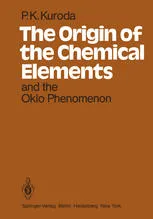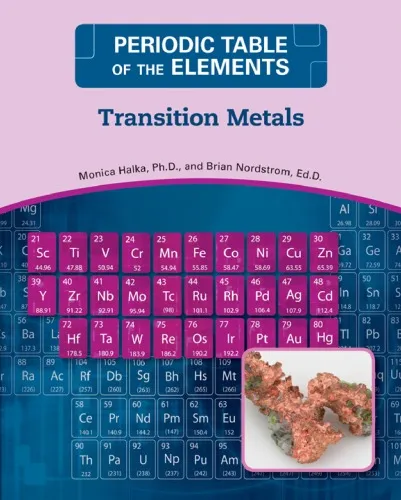The Origin of the Chemical Elements and the Oklo Phenomenon
4.6
Reviews from our users

You Can Ask your questions from this book's AI after Login
Each download or ask from book AI costs 2 points. To earn more free points, please visit the Points Guide Page and complete some valuable actions.Related Refrences:
Introduction to "The Origin of the Chemical Elements and the Oklo Phenomenon"
Written by Prof. Paul K. Kuroda, "The Origin of the Chemical Elements and the Oklo Phenomenon" offers a profound journey into the realms of nuclear science, geochemistry, and cosmology. This book encapsulates the fascinating origins of the chemical elements that constitute the universe and delves into the groundbreaking natural nuclear reactor discovered at Oklo in Gabon, Africa. A blend of scientific rigor and historical insight, the text provides readers with a deep understanding of the processes that shaped our cosmos and sheds light on one of the most extraordinary phenomena ever observed in geology and nuclear physics.
The narrative blends theoretical insights with experimental evidence to form a coherent explanation of both the origin of elements in stellar environments and the unexpected consequences of their existence on Earth. This work not only caters to academics and scientists but also appeals to general science enthusiasts intrigued by the mysteries of cosmic evolution and nuclear energy.
Detailed Summary of the Book
The book is divided into two overarching focuses: the origin of chemical elements and the Oklo phenomenon. To begin with, Prof. Kuroda meticulously explains the cosmic processes responsible for the creation of all known elements. By tracing the history of stellar nucleosynthesis, the author explores how hydrogen and helium from the Big Bang served as the foundation for the formation of heavier elements in stars through nuclear fusion. These insights are complemented by discussions on supernovae, neutron star collisions, and the s-process and r-process pathways that generate elements like gold, uranium, and thorium.
The second part of the book is dedicated to the Oklo phenomenon—a natural nuclear reactor discovered in a uranium deposit that operated approximately 2 billion years ago. This discovery stunned the scientific community, proving that under the right geological conditions, spontaneous nuclear fission can occur naturally. The book breaks down the mechanism behind Oklo's criticality, exploring factors like isotope ratios, neutron moderation, and the implications for nuclear waste containment and disposal.
Prof. Kuroda also places the Oklo phenomenon within a broader scientific and philosophical context. From its role as a natural experiment in fission reactor dynamics to its implications for the age and consistency of physical constants in the universe, Oklo stands as a unique case study at the intersection of science, history, and human curiosity.
Key Takeaways
- The chemical elements that make up our universe were forged in stars and through explosive cosmic events.
- Oklo represents a natural nuclear fission reactor, a rare example of a self-sustaining nuclear reaction occurring without human intervention.
- The discovery of Oklo serves as proof of Earth's unique geological history and emphasizes the importance of isotope studies in understanding ancient phenomena.
- The book highlights the incredible stability of physical constants like the fine-structure constant over billions of years, as observed through the study of ancient nuclear reactions.
Famous Quotes from the Book
"The creation of the elements is one of the most astonishing triumphs of modern science, an event that bridges the cosmic and the terrestrial."
"That natural nuclear reactions occurred spontaneously at Oklo is not just a wonder of geology, but a reminder of the intricate, interconnected forces governing the universe."
"Our understanding of the universe comes not from isolated discoveries but through the cumulative inquiry, where questions of yesterday become the foundations of tomorrow's revelations."
Why This Book Matters
This book is more than an exploration of nuclear science; it represents a celebration of humanity's ability to investigate profound questions about our existence. Prof. Kuroda presents a meticulous scientific narrative that captures the formation of our universe and the processes that shaped it, making it an essential resource for physicists, chemists, geologists, and cosmologists alike.
Moreover, the Oklo phenomenon demonstrates that Earth's history continues to reveal surprises, offering a fascinating context for studies in both theoretical and applied nuclear science. By addressing fundamental questions about the universality of physical laws, the stability of matter, and the origins of complexity, this book inspires readers to reconnect with the sheer magnificence of scientific exploration and discovery.
The significance of this work lies in its interdisciplinary approach, bridging astrophysics, geology, and nuclear science to deliver insights that resonate far beyond the laboratory or classroom. Whether you're curious about stellar nucleosynthesis, the stability of atomic structures across eons, or the nature of Earth's hidden processes, this book provides the tools and knowledge to embark on a rewarding intellectual journey.
Free Direct Download
You Can Download this book after Login
Accessing books through legal platforms and public libraries not only supports the rights of authors and publishers but also contributes to the sustainability of reading culture. Before downloading, please take a moment to consider these options.
Find this book on other platforms:
WorldCat helps you find books in libraries worldwide.
See ratings, reviews, and discussions on Goodreads.
Find and buy rare or used books on AbeBooks.
1409
بازدید4.6
امتیاز0
نظر98%
رضایتReviews:
4.6
Based on 0 users review
Questions & Answers
Ask questions about this book or help others by answering
No questions yet. Be the first to ask!





![The Ultimate iOS Interview Playbook: Conquer Swift, frameworks, design patterns, and app architecture [Team-IRA]](https://s3.refhub.ir/images/thumb/The_Ultimate_iOS_Interview_Playbook__Conquer__29925.webp)







